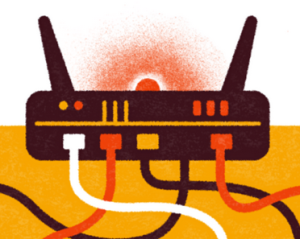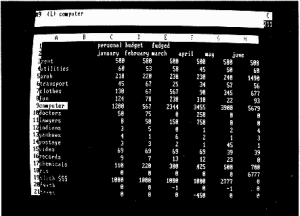 My buddy Bruce Buschel lived through an outage, thank you Verizon, and tells about it.
My buddy Bruce Buschel lived through an outage, thank you Verizon, and tells about it.
So funny, you might wish he’d been out longer.
 My buddy Bruce Buschel lived through an outage, thank you Verizon, and tells about it.
My buddy Bruce Buschel lived through an outage, thank you Verizon, and tells about it.
So funny, you might wish he’d been out longer.
Matt Levine writes about money at Bloomberg View. He’s funny, sensible and worth reading even if you don’t care about SEC disclosures. What?
http://www.bloombergview.com/articles/2014-10-29/high-speed-traders-avoid-low-speed-website
The basic idea is that massive megaliths like Comcast and Time Warner and, wait, are they merging? And every other cable company that has a monopoly because of community franchising, have some community responsibility.
That responsibility is called Net Neutrality.
Net Neutrality means different things to every communication company trying to stick citizens with higher bills for their cable and internet service.
To all of them it means lower revenue.
But to the people who pay absurd cable and internet bills each month, net neutrality means that no matter what any company offers over the internet pipes, the price is the same.
Competing services, like Red Box, Amazon and Netflix, might have different business strategies, might have different owners, but each should pay the same amount to transfer their data through the internet to your house.
That’s net neutrality.
The same should be true if you’re selling Marxism, Leninism or Maoism. The price is for bandwidth, not ideology.
Comcast and Time Warner and your cable company would like you to think that this is unfair. They’re wrong. They’ve tried to sell you on paying extra for faster pipes, and better video speeds. They may have made money doing this.
But the basic principle of the internet is equality, and that breaks down quickly when those who own the pipes are able to discriminate between different data streams passing through.
Which is why this cartoon from the Oatmeal resonates:
http://theoatmeal.com/blog/net_neutrality
The question is whether this video from Rockaway, New Jersey, reminds you more of Barbet Schroeder’s film version of Charles Bukowski’s Barfly, starring Faye Dunaway and Mickey Rourke, or is a leading example of why people are leaving the suburbs and moving back to the cities. In a hurry. If they have a choice.
I’m leaning toward Barfly.
This seems so impossible it is magical.
This is a fantastic history of the ebook publishing industry, and the dispute between the old school book publishers and Amazon about ebook pricing.
Except, it never says what spooks the old line publishers (and Andrew Wylie) explicitly.
But it alludes.
Here’s the deal: Print books make more money for publishers than ebooks. And if the price of ebooks falls too much, print books won’t be competitively priced and won’t sell.
For the time being, a print window might work (the same way Taylor Swift created a CD window last week by pulling her music off Spotify), but it doesn’t seem likely to work forever.
At the same time, traditional publishers are fighting to retain the large margin they get from print books. It’s hard to say they shouldn’t try while they can, but they won’t be able to do that or long.
We all love predictions, and Nate Silver has proven himself adept at making them, so it’s understandable attention turns his way on Election Day.
 What is also clear is that we have a hard time understanding the nature of a prediction, which is why Silver not only says what he thinks is going to happen but also offers the odds that he’ll be wrong. To determine these odds Silver turns to Bayes’ Theorum and the more modern Bayesians, who have developed a way to measure uncertainty in a prediction based on the work of the English statistician and minister, Thomas Bayes (pictured).
What is also clear is that we have a hard time understanding the nature of a prediction, which is why Silver not only says what he thinks is going to happen but also offers the odds that he’ll be wrong. To determine these odds Silver turns to Bayes’ Theorum and the more modern Bayesians, who have developed a way to measure uncertainty in a prediction based on the work of the English statistician and minister, Thomas Bayes (pictured).
This truth in packaging is what makes even Silver’s miscalls informational.
The mathematician Jordan Ellenburg takes a look at how many of Silver’s predictions will be wrong today in Slate, if Silver’s self-claimed odds of being wrong are correct. It won’t spoil the fun of reading the piece for me to tell you that Silver should be wrong about 2.5 senate races.
You can find the list here, along with its lame comments about each book. Here are my comments, probably equally lame and certainly less informed (these are books I haven’t read):
The Brothers Karamazov, Fyodor Dostoevsky: I love Dostoevsky, but he writes big novels about people with lots of big names, and so I haven’t read them all, including this one.
The Known World, Edward P. Jones: Pulitzer Prize winner.
American Pastoral, Phillip Roth: Another Pulitzer Prize winner. I’ve tried Roth a few times and once past Portnoy and Goodbye Columbus and another early one, I could never get started. For instance, the baseball one, the Great American Novel, just bugged me and I gave up a quarter of the way through. My loss I’m sure.
Sport and a Pastime, James Salter: On my list.
A Sense of Where You Are, John McPhee: McPhee is always great, and there is lots I haven’t read.
Invisible Man, Ralph Ellison: Embarrassing.
The Professional, W.C. Heinz: This one is a find for me. I’ve heard of it, but it wasn’t on my radar. Foreword by Elmore Leonard.
Revolutionary Road, Richard Yates: Saw the movie and read Tao Lin’s novel Richard Yates.
The Killer Angels, Michael Shaara: This is a book I’ve always wanted to read.
All the King’s Men, Robert Penn Warren: High on my list of classic American novels to read that I haven’t.
The Wind-Up Bird Chronicle, Haruki Murakami: Just haven’t gotten to Murakami.
Master and Commander, Patrick O’Brian: Everybody loves this one, and all those that follow. I’m sure they are as good as advertised, but I’m not excited.
Plainsong, Kent Haruf: National Book Award winner. Looks awful. I’m almost sure that’s wrong.
Winter’s Tale, Mark Helprin: I have two copies of this in the basement, but I think it’s the cover that makes me think badly of it. Or stop from starting it.
The Spy Who Came In From the Cold, John LaCarre’: I’m not a big fan of spy novels, but I should read this one.
CivilWarLand in Bad Decline, George Saunders: I read Tenth of December recently and I don’t admire or like his ability to render different voices. They seem phony to me. Not badly rendered, but bubbling with condescension and too much cleverness. Writing for readers who like to read writing. Hmm, put that second writing in quotes.
War and Peace, Leo Tostoy: Sure, on my list.
Moby Dick, Herman Melville: This one, too.
Midnight’s Children, Salman Rushdie: I waded into this once. Also tried the one that got him on the kill list. Too fancy for my taste, at least then.
Labyrinths, Jorge Luis Borges: I’ve read some of this book, but not much of it. I have been meaning to spend more time with it.
American Tabloid, James Ellroy: Another overwriter accorded lots of respect, at least partially because he can tell a crackling dark story.
What It Takes, Richard Ben Cramer: I used to read all the books about the making of the president and fear and loathing on the campaign trail and the boys on the bus, but at some point the notion that I was getting something useful started to fade. I chalked that up to maturity, though I thoroughly enjoyed Walter Shapiro’s One Man Caravan, about the pre-race for the president, before things actually got started. Maybe Cramer’s book is worthwhile.
So Long, See You Tomorrow, William Maxwell: I’ve read many Maxwell stories, but not this.
The Great Bridge, David McCullough: There is lots of McCullough worth reading, I’m not sure why this one would be the best, but then I haven’t read it.
Lonesome Dove, Larry McMurtry: Saw the miniseries.
Underworld, Don DeLillo: I read the excerpt that became the shorter book, Pafko at the Wall, and it truly is brilliant. There the novel sits on my wife’s bookshelf, beckoning. Someday, for sure, after Moby Dick.
Savages, Don Winslow: Sounds like fun. Missed the movie last year.
The Orphan Master’s Son, Adam Johnson: I don’t know anything about this book set in North Korea.
Let the Great World Spin, Colum McCann: On the bookshelf, on deck.
Hmm, 29 of 80 is a batting average of .362 of books missed (or .638 of books read). Good to know what’s missing, but they don’t tell half the story. Read on.
Paul Krugman argues that Amazon has too much power and is abusing it, and that abuse hurts America and Americans. He’s referring to Amazon’s battle with Hachette, which has been written about almost everywhere since it came to light last summer.
Amazon is not working hard to sell most of Hachette’s physical books because it wants Hachette to change the terms by which it sells its ebooks to Amazon. Krugman argues that Amazon is a monopsonist, a player with enough market power to drive prices down, and that this is a bad thing.
Book authors, my wife included, have protested that Amazon is using their well being as a negotiating tool against Hachette, undermining the business model that pays the writers who create the books.
Consumers can’t buy books that aren’t available, and books that aren’t available at Amazon are harder to buy, but it seems to me hard to argue that Amazon is hurting consumers by making it harder to buy books that are available elsewhere. And while their fight may be hurting writers in the short run, Amazon certainly isn’t arguing for a future without authors and books.
Krugman says Amazon has too much power, but he can’t say lower prices hurt consumers, so he makes an odder argument: “Book sales depend crucially on buzz and word of mouth (which is why authors are often sent on grueling book tours); you buy a book because you’ve heard about it, because other people are reading it, because it’s a topic of conversation, because it’s made the best-seller list. And what Amazon possesses is the power to kill the buzz. It’s definitely possible, with some extra effort, to buy a book you’ve heard about even if Amazon doesn’t carry it — but if Amazon doesn’t carry that book, you’re much less likely to hear about it in the first place.”
Is that true? Certainly the Today show or any other media outlet isn’t going to not book an author with an interesting book out because of the Amazon Hachette dispute. And the reason publishers send authors on those grueling tours is to promote sales in actual book stores, where the authors read and sign their books. Amazon doesn’t have that relationship with readers.
What it does have is enormous market power, lower prices, and an ability to do an end run around the interests of publishers. And that’s what this dispute is about. Amazon would like to crush the publishers, who to its mind add little value to a process that could be made much more efficient. And it would like to do that now, while it has a dominant position in book sales, since Amazon knows that competition from Apple, Google and Microsoft (with Barnes and Noble) is going to inevitably lead to a collapse in digital book prices.
By getting there first, Amazon will keep those big wolves away from its chicken coop.
Krugman seems to think that the publishers need protection from Amazon, as if they weren’t themselves each part of giant conglomerates, each with its own massive power center. Oddly, he doesn’t really say what he thinks should happen.
What should happen is nothing. If Amazon wants to mess with its relationships with its customers, by not selling them the books they want, so be it. Customers will go elsewhere.
In the meantime, Amazon is arguing that ebooks should cost much less than printed books because the incremental costs of each copy is much lower for the ebook. Hachette is arguing that if the cost of an ebook goes much lower sales of printed books will decline. This is important because Hachette knows that once ebooks dominate sales, its role in the book production chain will be undermined.
The move to ebooks would seem to be inevitable, eventually, and so Hachette is trying to slow its own march to oblivion. While Amazon knows that once ebooks dominate sales, the ecosystem of readers and online sales will be the one thing that differentiates it from the competition.
Which is why the knives are out. Let them play.
UPDATE: I found this Matthew Yglesias story from Vox after I wrote the above. He more elegantly makes many of the same points, and others that are also important. His points about the ability of publishers to promote books and the nature of the book advance are dead on.
I started using a spreadsheet to calculate my fantasy league standings, maybe in 1988. The program was called VP-Planner, and the front end of it was a clone of Lotus 1-2-3, which cost $500 at the time. VP-Planner cost $35, which for a regular guy was plenty.
But the real power and appeal of VP-Planner was it’s ability to access databases, and import specific data into the spreadsheet without a lot of tedious cutting and pasting.
Each week I would download the baseball stats from a sports gambler service in Las Vegas, massage the format to get it set, and click RECALC (F9) on my keyboard. My IBM XT would whirr and purr, and I would go to lunch.
Sometimes, the calculations were complete when I came back, sometimes not.
 My friend Steven Levy reprinted a story he wrote about spreadsheets for Harpers magazine this week at his new online mag, called Backchannel. It’s a fascinating look from a distant perch at the effect of the democratization of data and our ability to model systems quickly and fairly easily.
My friend Steven Levy reprinted a story he wrote about spreadsheets for Harpers magazine this week at his new online mag, called Backchannel. It’s a fascinating look from a distant perch at the effect of the democratization of data and our ability to model systems quickly and fairly easily.
In the middle of the piece he writes: “The computer spreadsheet, like the transcontinental railroad, is more than a means to an end. The spreadsheet embodies, embraces, that end, and ultimately serves to reinforce it. As Marshall McLuhan observed, “We shape our tools and thereafter our tools shape us.” The spreadsheet is a tool, and it is also a world view — reality by the numbers. If the perceptions of those who play a large part in shaping our world are shaped by spreadsheets, it is important that all of us understand what this tool can and cannot do.”
I suspect data journalists like Nate Silver and Ezra Klein could not agree more.